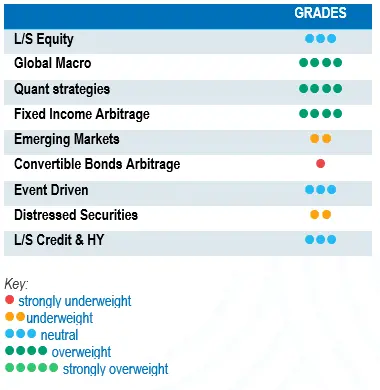 Although the economy continues to decelerate, equities staged a strong rebound during the month of October. The outperformance of cyclical versus defensive sectors might point to a market anticipating a recession less severe than expected or a successful soft landing, but in reality, it is hard to distinguish between contributions from bulls and covering cyclical short bets from risk-reducing bears.
Although the economy continues to decelerate, equities staged a strong rebound during the month of October. The outperformance of cyclical versus defensive sectors might point to a market anticipating a recession less severe than expected or a successful soft landing, but in reality, it is hard to distinguish between contributions from bulls and covering cyclical short bets from risk-reducing bears.
Equity index performances were overall strong during the month, apart for the correction observed in Asian equities. It is also interesting to note the significant underperformance of the Nasdaq versus the Dow Jones and small-midcap equity indices. Big tech companies’ earnings announcements have disappointed, with investors expecting increased efficiency and cost cutting.
US Treasury yields continued to rise over the month. The 10-year note ended the month at 4.07%, a level last reached in May 2008. European rates were more volatile. Although inflation is strong, the economy is less vigorous to support high interest rates. Corporate credit has attracted investor’s interest, leading to spreads narrowing significantly.
The HFRX Global Hedge Fund EUR returned -0.13% over the month.
Long-Short Equity
Long-Short Equity strategies performed relatively well over the month, although upside capture ratios were modest. This can be party explained by the low level of risk that managers are carrying for the moment. Strategies focusing on North America and Europe outperformed managers investing in Asia due to a positive beta tailwind. Overall, directional strategies outperformed moderate to low net exposure funds. However, performance from strategies with a bias to growth was modest due to a negative contribution from long positions in large cap technology companies. Since the start of the year, the Long-Short Equity fund’s average performance has been disappointing and alpha generation has been tough, but well diversified allocations to the Long-Short Equity universe have generated better results. As mentioned previously, we do not expect funds to add significant levels of risk for the moment, but rather selectively invest in longs and refresh their short books. Challenges continue to pile up for corporations, and the world post-Covid, post-war and post-QE will probably be very different from the one we lived in following the Great Financial Crisis.
Global Macro
Performances were mixed for Global Macro managers over the month, with indices averaging returns slightly above or below zero. The equities market changed direction abruptly, putting managers’ convictions to the test. After such a beating on equities and bonds since the start of the year, bearish positioning is less consensual across the universe. Managers who think that equity multiples or earnings expectations are too optimistic underperformed over the month, losing money on their short equity positions. From a tactical viewpoint, discretionary managers ran lower risk levels, fearing trendless volatile markets over the short term or short squeezes in oversold areas of the market. The opportunity set for Global Macro strategies has improved, and is expected to remain better for the foreseeable future. The Fed is taking liquidity out of the system and is determined to battle inflation even if this leads to more challenging economic conditions. Asset risk premiums are moving across the board, and macro managers are capitalising on these market moves. We continue to favour discretionary opportunistic managers who can draw on their analytical skills and experience to generate profits from selective opportunities worldwide.
Quant strategies
Quantitative strategies were overall positive during the month. Returns generated by trend-following strategies were more modest but still positive overall. The equities rally during October was generally a negative contributor for trend followers since they were mainly holding short positions. These were positively offset by gains in bonds and currencies. Multi-strategy quant managers were generally strong across the board. Since the start of the year, Quantitative strategies have been strong diversifiers and are among the best performers within the hedge fund universe.
Fixed Income Arbitrage
Central banks across the world apart from Japan maintain their willingness to tackle inflation, triggering a new equity sell-off in September, while short-term interest rates reached new highs. However, the long end of the curve was subject to a more problematic trend. While most macro managers were able to capture these moves, a key factor of the month-end was the significant risk reduction. Volatility remained high and fixed income RV managers benefitted from healthy opportunities both in Europe (France, Germany) and the US.
Emerging Markets
Performance was mixed for strategies with a focus on emerging markets. Managers with a higher focus on Asia on average lagged strategies with more diversified investment exposure. The strong dollar and expectations of further monetary tightening by the Fed do not usually correlate well with a positive sentiment for the region. The strength of commodity prices has provided strong support to opportunities in Latin America and other export-driven nations. Performances vary across managers, depending on their area of focus. Few hedge funds cover emerging markets. They tend to be specialists in narrower geographical regions. This strategy offers selective investment opportunities, but we remain overall cautious for the moment, as decreasing growth expectations and rising interest rates in developed markets are warning indicators for the region.
Risk arbitrage – Event-driven
Merger Arbitrage strategies returns were positive for the month. Last month, the Department of Justice’s failure to block the acquisition of Change Healthcare by United Health sent a positive signal to the market. Merger Arbitrage strategies are relatively well insulated from rising rates, since deal spread risk premiums tend to incorporate higher risk-free rates than sovereign issues to compensate arbitrageurs for holding these equities until the deal closes. Deal volumes for 2022 are lower than levels experienced last year. This could be seen as a normal reaction from corporate board rooms in a period of greater uncertainty and rising financing costs. Nonetheless, there is still meat on the bone, and strategic acquisitions in sectors such as healthcare, gaming and technology continue to be announced. Current deal spreads are wide, generating a potential low double-digit return opportunity far above this type of strategy’s long-term average return. However, there is no free lunch. There are higher risks of regulatory intervention, companies trying to walk away from a deal or the possibility that acquisition offers are shut down by shareholder vote. The current nervousness on equity and credit markets necessitates more caution when investing in Event-Driven strategies, due to a higher probability of deal breaks. On the other hand, Merger Arbitrage provides an interesting tool that is structurally short duration, where deal spreads are positively correlated to increases in interest rates.
Distressed
Bankruptcy headlines have captured the implosion of hedge fund strategies and financial intermediaries active in digital assets. The dramatic fall in the value of crypto currencies has put the spotlight on a specific number of crypto investors and crypto lenders. Fortunately, this concerns only a very niche segment of the hedge fund universe. Currently, default rates of sovereign and corporate issuers remain relatively low, but the rapid widening of credit spreads and the deterioration of economic fundamentals will lead to a rise in companies running into trouble. Leading managers are still waiting for further dislocations to happen before going on the offensive.
Long short credit & High yield
Long short credit managers have done well compared to traditional credit funds. Their short books and hedges have helped mitigate the impact of widening spreads on long holdings. Some managers think that the situation does not look particularly upbeat, and they need to focus to pick the right issues, with particular attention paid to corporate leverage levels and covenants. As the markets are expecting rates to continue to rise and economic growth to decelerate, the best managers remain diversified, investing in quality longs and focusing on industries with higher pricing power.
